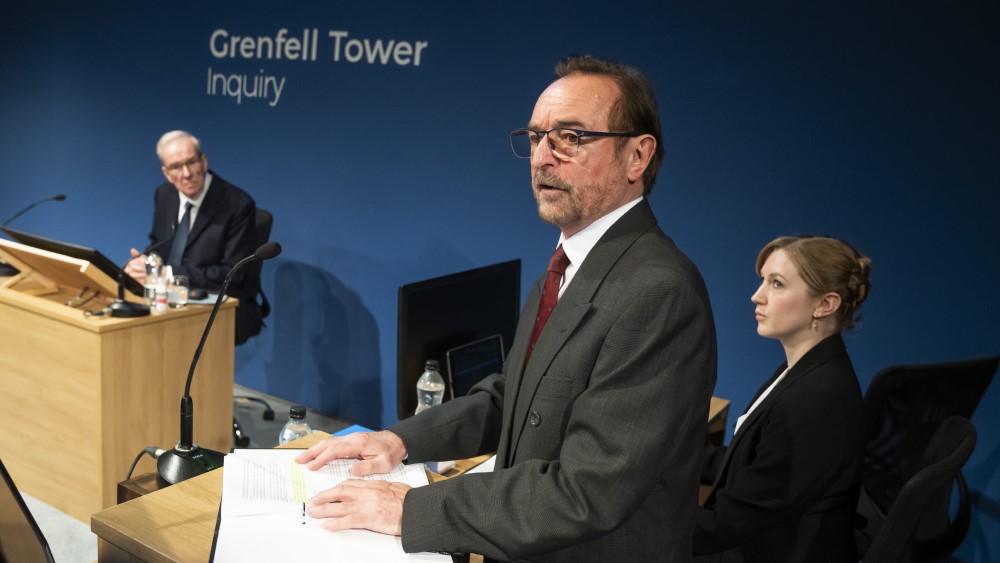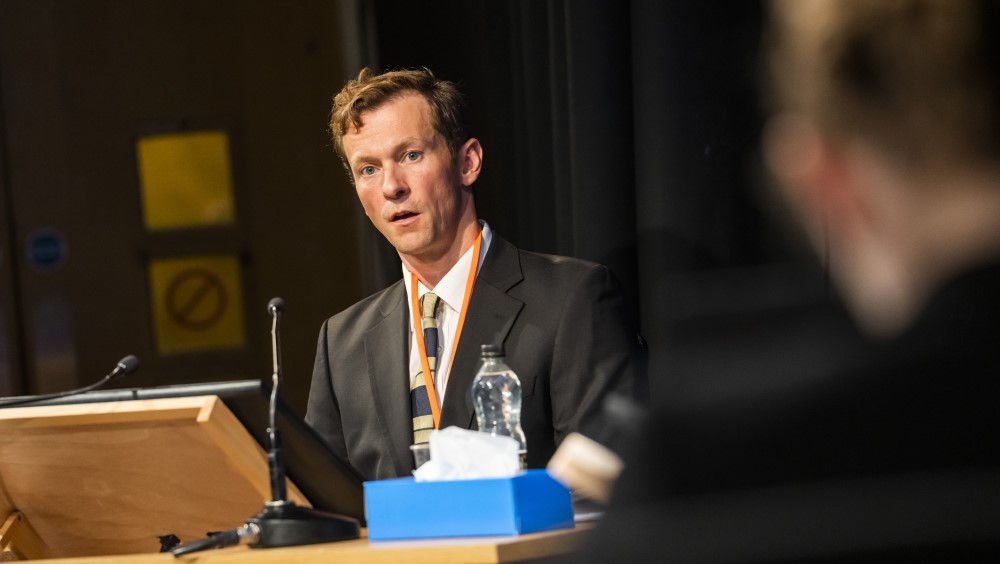The theatre production about the Grenfell Tower Inquiry, which opened this month, puts the built environment sector and all its murkiest machinations in the spotlight.

The construction industry takes centre stage in a new play about the Grenfell Tower Inquiry – but not in a good way.
Value Engineering – Scenes from the Grenfell Inquiry opened this month at Notting Hill’s Tabernacle Theatre in west London, less than a mile from the scene of the tragedy where 72 people died on 14 June 2017. Director Nicholas Kent told CM in an earlier interview that the ‘verbatim theatre’ production – which sees actors speak the exact words of participants in the Inquiry – would “call failings to account”. And so it does.
We get an early indication of what’s to come at the opening of phase two of the Inquiry – which centres on the tower’s refurbishment and is the main focus of the play – when leading counsel to the inquiry Richard Millett QC (played by Ron Cook), says:
“Mr Chairman, in my opening address of this inquiry [on 4 June 2018] I invited the core participants not to indulge in a merry-go-round of buck-passing. Regrettably, that invitation has not been accepted.”
Millett – and his assistant Kate Grange QC (played by Polly Kemp) – go onto demonstrate the ‘buck-passing’ and other failings among Grenfell’s construction supply chain as they step forward, one by one, to give evidence.
First up is Bruce Sounes (played by Tim Lewis), associate with architect Studio E (which has since gone into liquidation).
Grange asks him: “Is it your evidence that you understood Studio E’s role did not involve checking that the drawings were technically correct or compliant with the building regulations?”
Sounes replies: “We were not engaged to confirm compliance on anything I felt.”

Next, Millett calls main contractor Rydon’s contracts manager Simon Lawrence (played by Phill Langhorne).
“Did Rydon have any processes in place to ensure the need for effective five barriers as set out in the specification was properly considered?”
“By appointing the specialist that knew what fire barriers were and where they needed to go,” answers Lawrence.
“Who were those in relation to fire barriers?”
“The specialist subcontractor was Harley Curtain Wall. And then we also had the design team, Studio E.”
“So not wishing to summarise your evidence unfairly, but reliance on others?” asks Millett.
“Yes.”
The QC then puts this to Ray Bailey (played by David Robb), director of Harley.
“Do you accept that, as specialist contractor responsible for the façade on the Grenfell Tower project, the buck stopped with Harley on products and design?”
“No,” says Bailey.
“Why not?”
“Because there is a raft of layers with Harley, with the architects, Building Control to ensure the design is compliant.”
The script, by former Guardian security editor Richard Norton-Taylor, is understandably constrained by time, but does a decent job of condensing 2,332 witness statements into a narrative that is accessible to the layperson, while still diving into the technical failings of the main construction players and the regulations which governed their behaviour.
The production, which runs for two-and-a-half hours, makes clever use of overhead screens to show incriminating snippets from emails and occasionally some video footage from the fire. Apart from two monologues to the audience, the focus is kept solely on the QCs and those giving evidence; at times it is easy to forget you are in a theatre, rather than in the inquiry itself.
The play concludes by displaying the names of the 72 Grenfell dead on screen, a sobering reminder of the human cost of the tragedy.
Value Engineering – Scenes from the Grenfell Inquiry is showing at the Tabernacle Theatre until 13 November.
Comments
Comments are closed.












I would say this is no appropriate at this time.
People need time to absorb the true facts which are still being analysed and debated.
There is time for theatre at a later date.
Denis Barry.
MCIOB.
Shameless opportunity to paraiah an individual(s) with no substantiation or detailed knowledge of what occured. How a poxy amateur dramatic society understands about the complexities of this convulated issue you could write on a pin, yet somehow they are free to convey at will on case thats has even been completed yet!